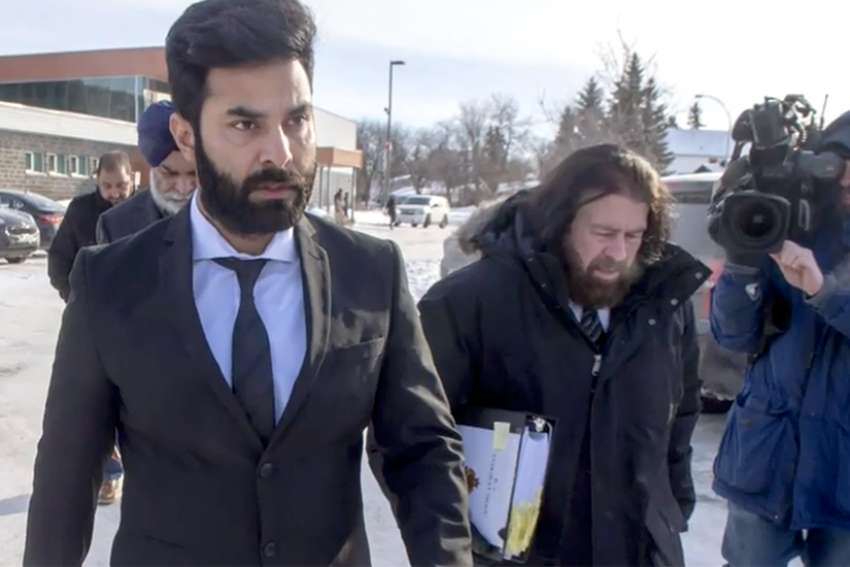The anger expressed in some victim impact statements presented at the sentencing hearing for Jaskirat Singh Sidhu is understandable. Sidhu is the semi-trailer driver responsible for the deaths of 16 people and the injuries suffered by another 13 in Humboldt Broncos bus tragedy last April 6. The loved ones of those who wrote impact statements had been killed or seriously injured in an avoidable crash.
“I despise you for taking my baby away,” one mother of a teenage hockey player told Sidhu in the Melfort, Sask., courtroom.
If the crash were “an accident” with no culpability on the driver’s part, it might have been easier to forgive him. In this instance, he ran a stop sign at full speed and the bus crashed into his semi-trailer. Sidhu admitted his guilt and apologized to the parents, spouses and other loved ones of the victims of the crash. Yet, his remorse could never assuage the suffering of the family members or restore the lives of those on the bus.
Yet, somehow Christina George-Haugan, wife of the dead Broncos’ coach, Darcy Haugan, found the ability to forgive Sidhu. “I have been forgiven for things when I did not deserve it, so I will do the same,” she told the court.
Before we attribute her willingness to forgive to the grace of God, ask another question: In what society would you prefer to live — one in which the victims of wrongdoing despise the wrongdoers or one in which the victims forgive those who caused their suffering?
The former type of society would descend to the level which philosopher Thomas Hobbes described as full of “continual fear and danger of violent death, and the life of man solitary, poor, nasty, brutish and short.” Vengefulness wreaks more vengefulness, isolates each individual and fosters a climate of fear. Not a happy prospect.
A societal propensity to forgiveness, however, holds the promise of a harmonious community, one where the constant threat of violence is replaced by trust in each other and the opportunity to build for the future.
Forgiveness does not mean whitewashing others’ immoral actions or eliminating punishment for criminals. Nor does it abolish the pain people experience following tragedies such as the Broncos’ bus crash. But it does mean those affected will not be forever trapped in their suffering, unable to begin life again.
Jewish philosopher Hannah Arendt called Jesus “the discoverer of the role of forgiveness in the realm of human affairs.” Arendt also argued that, for Jesus, it is not true that only God has the power to forgive. Rather, humans must “mobilize” forgiveness for those who have done them harm before they can receive God’s forgiveness.
Perhaps Arendt’s views do not accord with Christian teaching which finds God’s mercy evident in the Hebrew Scriptures. The hope of forgiveness was present before Jesus “discovered” it. Yet, Arendt maintains that forgiveness has importance for all people, Christian or not.
Revenge, she says in The Human Condition, is the predictable human reaction to transgression, but forgiveness is unexpected and unpredictable. Forgiving is “the only reaction which does not merely re-act, but acts anew and unexpectedly, unconditioned by the act which provoked it and therefore from its consequences both the one who forgives and the one who is forgiven.”
Theologically, God’s forgiveness is given to those who “forgive those who trespass against us.” Yet, even if one rejects that theological foundation, forgiveness frees us from a painful past and allows us to live into the future. A free, orderly society requires not only justice, but also mercy.
Still, a secular forgiveness tends to topple over into laxity. If the supremacy of God is acknowledged, our forgiveness bears fruit, not only in social peace, but also in the forgiveness that God offers. But a society that does not respect God has no “payoff” for forgiveness other than the one forgiven receives a lesser punishment. In that case, the person who might forgive another fears that forgiveness will promote laxity.
In a society without God, forgiveness can backfire. Yet while faith is its own reward, it also removes the fear from forgiveness. The person of faith sees forgiveness in an eternal context. By living in God’s kingdom now, we also participate in its full realization beyond this mortal realm. Christian forgiveness does make a difference, one that is all to the positive.
(Glen Argan writes from Edmonton.)


